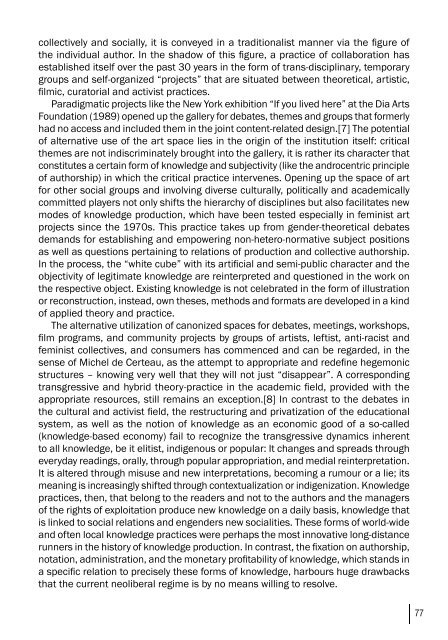art-e-conomy _ reader - marko stamenkovic
art-e-conomy _ reader - marko stamenkovic
art-e-conomy _ reader - marko stamenkovic
You also want an ePaper? Increase the reach of your titles
YUMPU automatically turns print PDFs into web optimized ePapers that Google loves.
collectively and socially, it is conveyed in a traditionalist manner via the figure of<br />
the individual author. In the shadow of this figure, a practice of collaboration has<br />
established itself over the past 30 years in the form of trans-disciplinary, temporary<br />
groups and self-organized “projects” that are situated between theoretical, <strong>art</strong>istic,<br />
filmic, curatorial and activist practices.<br />
Paradigmatic projects like the New York exhibition “If you lived here” at the Dia Arts<br />
Foundation (1989) opened up the gallery for debates, themes and groups that formerly<br />
had no access and included them in the joint content-related design.[7] The potential<br />
of alternative use of the <strong>art</strong> space lies in the origin of the institution itself: critical<br />
themes are not indiscriminately brought into the gallery, it is rather its character that<br />
constitutes a certain form of knowledge and subjectivity (like the androcentric principle<br />
of authorship) in which the critical practice intervenes. Opening up the space of <strong>art</strong><br />
for other social groups and involving diverse culturally, politically and academically<br />
committed players not only shifts the hierarchy of disciplines but also facilitates new<br />
modes of knowledge production, which have been tested especially in feminist <strong>art</strong><br />
projects since the 1970s. This practice takes up from gender-theoretical debates<br />
demands for establishing and empowering non-hetero-normative subject positions<br />
as well as questions pertaining to relations of production and collective authorship.<br />
In the process, the “white cube” with its <strong>art</strong>ificial and semi-public character and the<br />
objectivity of legitimate knowledge are reinterpreted and questioned in the work on<br />
the respective object. Existing knowledge is not celebrated in the form of illustration<br />
or reconstruction, instead, own theses, methods and formats are developed in a kind<br />
of applied theory and practice.<br />
The alternative utilization of canonized spaces for debates, meetings, workshops,<br />
film programs, and community projects by groups of <strong>art</strong>ists, leftist, anti-racist and<br />
feminist collectives, and consumers has commenced and can be regarded, in the<br />
sense of Michel de Certeau, as the attempt to appropriate and redefine hegemonic<br />
structures – knowing very well that they will not just “disappear”. A corresponding<br />
transgressive and hybrid theory-practice in the academic field, provided with the<br />
appropriate resources, still remains an exception.[8] In contrast to the debates in<br />
the cultural and activist field, the restructuring and privatization of the educational<br />
system, as well as the notion of knowledge as an economic good of a so-called<br />
(knowledge-based e<strong>conomy</strong>) fail to recognize the transgressive dynamics inherent<br />
to all knowledge, be it elitist, indigenous or popular: It changes and spreads through<br />
everyday readings, orally, through popular appropriation, and medial reinterpretation.<br />
It is altered through misuse and new interpretations, becoming a rumour or a lie; its<br />
meaning is increasingly shifted through contextualization or indigenization. Knowledge<br />
practices, then, that belong to the <strong>reader</strong>s and not to the authors and the managers<br />
of the rights of exploitation produce new knowledge on a daily basis, knowledge that<br />
is linked to social relations and engenders new socialities. These forms of world-wide<br />
and often local knowledge practices were perhaps the most innovative long-distance<br />
runners in the history of knowledge production. In contrast, the fixation on authorship,<br />
notation, administration, and the monetary profitability of knowledge, which stands in<br />
a specific relation to precisely these forms of knowledge, harbours huge drawbacks<br />
that the current neoliberal regime is by no means willing to resolve.<br />
77


